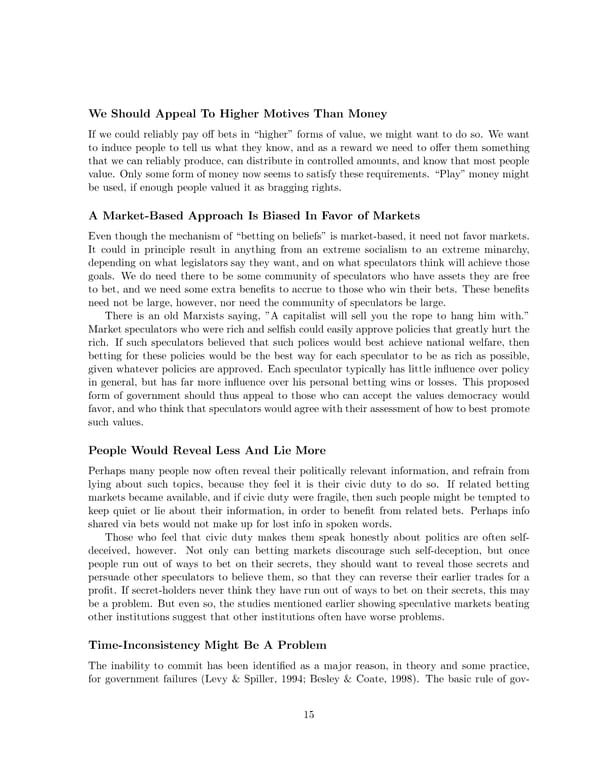WeShould Appeal To Higher Motives Than Money If we could reliably pay off bets in “higher” forms of value, we might want to do so. We want to induce people to tell us what they know, and as a reward we need to offer them something that we can reliably produce, can distribute in controlled amounts, and know that most people value. Only some form of money now seems to satisfy these requirements. “Play” money might be used, if enough people valued it as bragging rights. AMarket-Based Approach Is Biased In Favor of Markets Even though the mechanism of “betting on beliefs” is market-based, it need not favor markets. It could in principle result in anything from an extreme socialism to an extreme minarchy, depending on what legislators say they want, and on what speculators think will achieve those goals. We do need there to be some community of speculators who have assets they are free to bet, and we need some extra benefits to accrue to those who win their bets. These benefits need not be large, however, nor need the community of speculators be large. There is an old Marxists saying, ”A capitalist will sell you the rope to hang him with.” Market speculators who were rich and selfish could easily approve policies that greatly hurt the rich. If such speculators believed that such polices would best achieve national welfare, then betting for these policies would be the best way for each speculator to be as rich as possible, given whatever policies are approved. Each speculator typically has little influence over policy in general, but has far more influence over his personal betting wins or losses. This proposed form of government should thus appeal to those who can accept the values democracy would favor, and who think that speculators would agree with their assessment of how to best promote such values. People Would Reveal Less And Lie More Perhaps many people now often reveal their politically relevant information, and refrain from lying about such topics, because they feel it is their civic duty to do so. If related betting markets became available, and if civic duty were fragile, then such people might be tempted to keep quiet or lie about their information, in order to benefit from related bets. Perhaps info shared via bets would not make up for lost info in spoken words. Those who feel that civic duty makes them speak honestly about politics are often self- deceived, however. Not only can betting markets discourage such self-deception, but once people run out of ways to bet on their secrets, they should want to reveal those secrets and persuade other speculators to believe them, so that they can reverse their earlier trades for a profit. If secret-holders never think they have run out of ways to bet on their secrets, this may be a problem. But even so, the studies mentioned earlier showing speculative markets beating other institutions suggest that other institutions often have worse problems. Time-Inconsistency Might Be A Problem The inability to commit has been identified as a major reason, in theory and some practice, for government failures (Levy & Spiller, 1994; Besley & Coate, 1998). The basic rule of gov- 15
 Shall We Vote on Values, But Bet on Beliefs? Page 16 Page 18
Shall We Vote on Values, But Bet on Beliefs? Page 16 Page 18